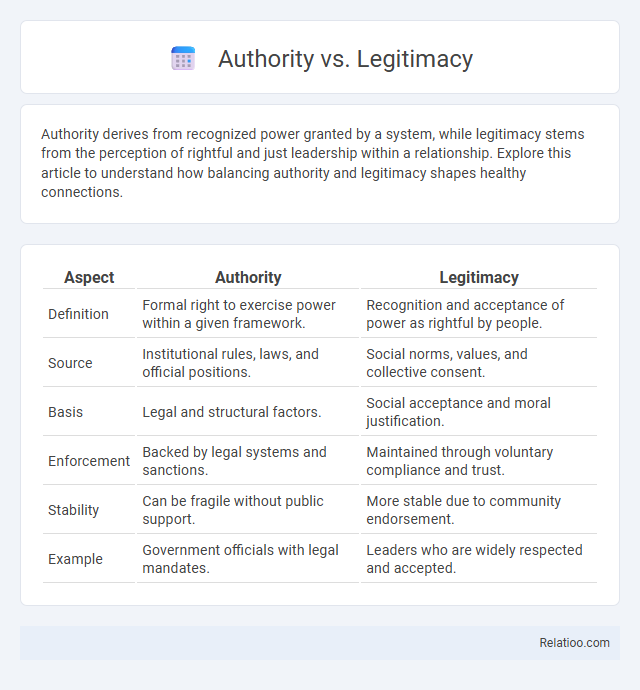Authority derives from recognized power granted by a system, while legitimacy stems from the perception of rightful and just leadership within a relationship. Explore this article to understand how balancing authority and legitimacy shapes healthy connections.
Table of Comparison
| Aspect | Authority | Legitimacy |
|---|---|---|
| Definition | Formal right to exercise power within a given framework. | Recognition and acceptance of power as rightful by people. |
| Source | Institutional rules, laws, and official positions. | Social norms, values, and collective consent. |
| Basis | Legal and structural factors. | Social acceptance and moral justification. |
| Enforcement | Backed by legal systems and sanctions. | Maintained through voluntary compliance and trust. |
| Stability | Can be fragile without public support. | More stable due to community endorsement. |
| Example | Government officials with legal mandates. | Leaders who are widely respected and accepted. |
Understanding Authority: Definition and Types
Authority refers to the recognized power granted to an individual or institution to make decisions and enforce rules within a specific context, while legitimacy is the widespread acceptance and justification of that power by those governed. Understanding authority involves distinguishing between types such as traditional authority, which is rooted in customs and established practices; charismatic authority, based on personal appeal and leadership qualities; and legal-rational authority, grounded in formal rules and laws. Your comprehension of these types helps clarify how authority operates in various social, political, and organizational settings, shaping interactions and governance effectiveness.
Defining Legitimacy in Governance
Legitimacy in governance refers to the recognized right and acceptance of an authority to exercise power, grounded in legal, moral, or social standards. Unlike mere authority, which is the ability to enforce decisions, legitimacy ensures that the governed perceive the authority as just and appropriate, fostering voluntary compliance. Factors influencing legitimacy include rule of law, transparency, accountability, and alignment with cultural and ethical norms.
The Core Differences Between Authority and Legitimacy
Authority refers to the recognized power or right to make decisions, enforce rules, and command obedience within a social or organizational structure. Legitimacy, however, is the generalized perception that this authority is rightful, just, and accepted by the governed or members of the society, based on shared values, laws, or norms. The core difference lies in authority being the formal or institutionalized power, while legitimacy is the social acceptance and justification of that authority, which sustains its effectiveness and long-term stability.
Sources of Authority: Traditional, Charismatic, and Legal-Rational
Sources of authority include traditional, charismatic, and legal-rational types, each defined by different bases of power. Traditional authority rests on established customs and long-standing practices, often seen in monarchies or tribal leadership. Charismatic authority derives from a leader's personal appeal and extraordinary qualities, while legal-rational authority is grounded in formal rules, laws, and bureaucratic structures, shaping how your organization or society accepts and respects power.
Foundations of Political Legitimacy
Foundations of political legitimacy rest on the acceptance and justification of authority by the governed population. Authority requires a recognized right to exercise power, while legitimacy involves the broader social and moral acceptance of that power as just and appropriate. You gain political stability and cooperation when both authority and legitimacy align, reinforcing the foundation of governance.
The Role of Consent in Legitimate Power
Legitimate power derives fundamentally from the consent of the governed, distinguishing it from mere authority, which may rely solely on positional control or coercion. Your ability to influence others sustainably depends on the acceptance and recognition of your power as rightful and justified. Consent serves as the critical mechanism that converts authority into legitimate power, ensuring compliance and stability within a social or organizational system.
Authority Without Legitimacy: Risks and Consequences
Authority without legitimacy often leads to instability and erosion of public trust, as power exercised without rightful consent can provoke resistance and undermine governance effectiveness. Such authority risks fostering corruption, repression, and social unrest, diminishing the ability to implement policies or maintain order. Historical examples demonstrate that regimes lacking legitimacy frequently face challenges in sustaining control, resulting in political crises or systemic collapse.
Legitimacy Crisis: Causes and Impacts
Legitimacy crisis occurs when the perceived right of a governing authority to rule is fundamentally questioned by the population, often triggered by corruption, lack of transparency, or failure to meet societal needs. This erosion in legitimacy leads to diminished public trust and may incite civil unrest, decreasing the authority's capacity to maintain order and effectively govern. The distinction between authority, the actual power to enforce rules, and legitimacy, the recognized right to do so, becomes critical in understanding governance stability during such crises.
Building and Sustaining Legitimate Authority
Building and sustaining legitimate authority requires aligning power with recognized rules, societal norms, and ethical standards that resonate with Your audience's values. Authority gains legitimacy when leadership earns trust through transparency, consistency, and fairness, reinforcing the social contract between leaders and followers. Effective leaders continuously validate their authority by demonstrating competence, accountability, and responsiveness to community needs, thereby ensuring long-term influence and acceptance.
Case Studies: Authority vs. Legitimacy in Modern Politics
Case studies in modern politics reveal how legitimacy often determines the durability of authority, as seen in democratic governments where electoral processes grant legitimacy to power holders. Conversely, authoritarian regimes may possess de facto authority through coercion but lack widespread legitimacy, leading to contested governance and potential instability. Examples include Venezuela's Nicolas Maduro, whose authority is questioned internationally despite controlling state apparatus, contrasting with Germany's Angela Merkel, whose authority is derived from legitimate democratic mandates.

Infographic: Authority vs Legitimacy
 relatioo.com
relatioo.com